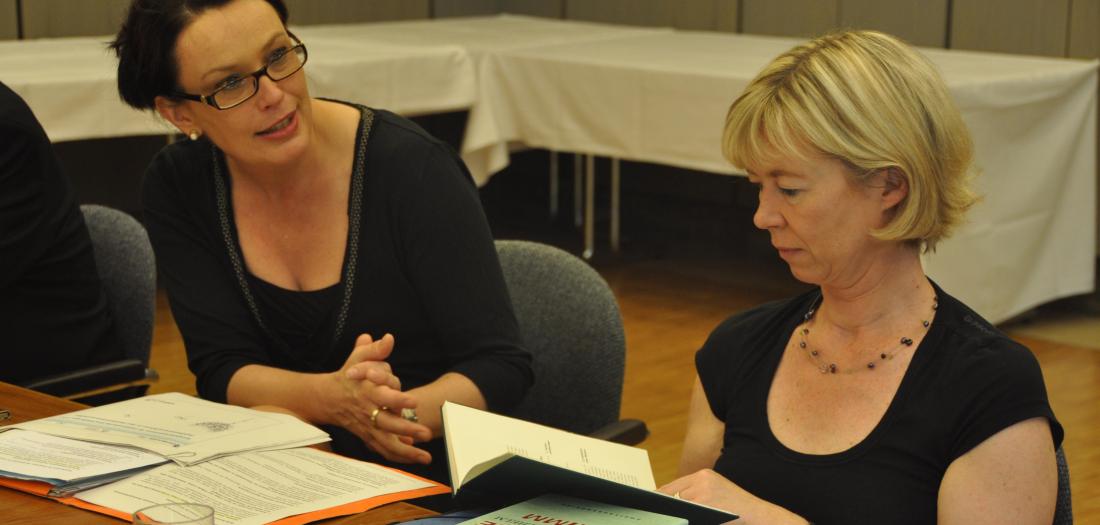Humanities on the way to the electronic future
Cooperation agreed
02.07.2009 | General

Framework agreement signed
But how can these basic works be digitized in a meaningful way? What standards must be adhered to? What advantages does the Internet offer in terms of networking and research? How can new user habits be taken into account? The two institutions will jointly answer such questions about long-term digital archiving, but also about the subsequent digitization of primary sources and publications, as well as the digital conception and networking of current research projects. In the presence of Doris Ahnen, Minister of State for Education, Science, Youth and Culture in Rhineland-Palatinate, representatives of the Union of the German Academies of Sciences and Humanities and the Competence Center for Electronic Cataloguing and Publishing in the Humanities at the University of Trier therefore signed a framework agreement in Mainz on July 2, 2009.
"I am pleased that a proven cooperation is being intensified and expanded here. The humanities in Rhineland-Palatinate are thus demonstrating once again that cooperation here is enjoyable and fruitful," emphasized Doris Ahnen, Minister for Education, Science, Youth and Culture. "This framework agreement is another building block of Rhineland-Palatinate's research policy, which also aims to bundle university and non-university competencies in order to create more visible structures," she continued.
"Together, this cooperation will lead us to the forefront of the digital movement," Prof. Dr. Günter Stock, president of the Union of Academies, told members of the press in Mainz. University President Schwenkmezger was also pleased about the cooperation: "This agreement confirms the high performance of the Trier Competence Center of Prof. Dr. Claudine Moulin and her team."
The Competence Center for Electronic Indexing and Publishing in the Humanities at the University of Trier has built an excellent reputation in the field for many years and is therefore the preferred cooperation partner of the Union of Academies. Thanks to past cooperation, some academy projects are leading the way when it comes to publishing their research results digitally, creating intelligent search options and links, and thus making them more manageable for experts and interested laypersons. Whereas a German scholar previously had to look up the meaning of "demonic" in Goethe's Faust or a Middle High German word from the Song of the Nibelungs in four or five books, today interlinked dictionaries such as the Goethe dictionary, the German dictionary of Jacob and Wilhelm Grimm, or the Middle High German dictionaries at http://www.woerterbuchnetz.de provide him or her with information quickly and easily. Dictionaries and editions are also gradually being linked to their sources and digital text archives, giving them a new quality. Digital editing systems enable the cooperation of workplaces in different locations and, above all, the output of data in book form and as an Internet publication.
Eleven years after its foundation, the Competence Center for Electronic Cataloguing and Publishing in the Humanities at the University of Trier is firmly anchored in the digital research landscape. It is a leader in the digital storage and processing of cultural knowledge (eHumanities = enhanced humanities) and a sought-after cooperation partner at national and international level. The German science academies have been partners from the very beginning; cooperation has been continuously intensified in more than 30 joint projects to date. Examples include the Goethe Dictionary, the Hand Dictionary of Ancient Slavery, and the Reallexikon für Antike und Christentum. The competence center develops standards and tools for electronic working and publishing for these projects and offers them comprehensive services for the development, presentation and storage of electronic work results.
The Union of the German Academies of Sciences and Humanities is the umbrella organization of eight academies of sciences and humanities that have joined forces to implement common interests. Under the umbrella of the Union, more than 1600 scientists from a wide range of disciplines are united, who are among the nationally and internationally outstanding representatives of their disciplines. The Union coordinates the "Akademienprogramm", which is one of the largest and most important research programs in the humanities in the Federal Republic of Germany. It promotes communication between the academies, carries out press and public relations work and organizes events on current problems in science. The Union of Academies communicates with scientific organizations in Germany and abroad and sends representatives to national and international scientific organizations.

